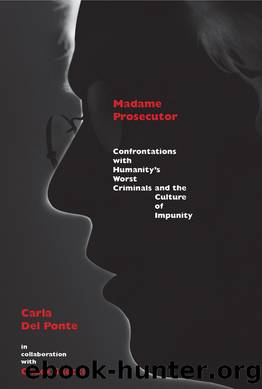Madame Prosecutor by Carla Del Ponte

Author:Carla Del Ponte [Ponte, Carla Del]
Language: eng
Format: epub
ISBN: 978-1-59051-537-2
Publisher: Other Press
Published: 2011-10-10T16:00:00+00:00
When Belgrade’s lawyers met with the Trial Chamber’s judges to request protective measures for the Supreme Defense Council documents, they produced this letter, which in no way constitutes any kind of agreement or deal.
Belgrade soon began arresting and transferring more of the tribunal’s accused to The Hague: on May 17, the transfer of Miroslav Radić, who allegedly participated in the execution of prisoners removed from Vukovar’s hospital; on May 30, the transfer of Frenki Simatović; on June 11, the transfer of Jovica Stanišić; on June 13, the capture of šljivan čanin, at home, in his underwear; on July 4, the surrender of the alleged former commander of the notorious Omarska concentration camp, Željko Mejakić; on August 15, the transfer of Mitar Rašević, allegedly a commander of the guards at an infamous prison in Fo ča; on September 25, the surrender of Vladimir Kova čević, who allegedly commanded an artillery attack on Dubrovnik.
By June 16, Zoran Lilić had also flown to The Hague, not to take up residence in the tribunal’s detention unit beside Milošević and the others, but to become the highest-ranking Serb insider to testify in the Milošević trial. Lilić did not provide smoking-gun evidence of Slobodan Milošević’s complicity in genocide. He even chummed around with Milošević during cross-examination. But Lilić’s testimony, especially during direct examination, amounted to a quantum leap into the realm of crucial evidence. In the opinion of prosecution analysts, Lilić’s testimony demonstrated that Milošević played the dominant role in the Supreme Defense Council and linked him with the establishment of the clandestine mechanism to pay the hundreds of Yugoslav Army officers, including Ratko Mladić, who had been directing the armed forces of the Serbs in Croatia and in Bosnia and Herzegovina. Lilić confirmed that the notorious Red Berets fit within the structure of the Ministry of Interior in Belgrade, that their political commander was Stanišić, and that Stanisić had reported directly to Milošević. Lilić’s testimony showed that Belgrade and the Serbs in Croatia and in Bosnia and Herzegovina had established a special council to coordinate “state policy.” Lilić’s testimony showed that key Serbs from Bosnia and Croatia, including Ratko Mladić, met frequently with Milošević and that General Perišić met with Milošević on military issues outside of the Supreme Defense Council framework. But most importantly, and most damaging for Milošević, were those Supreme Defense Council records Lilić brought into evidence, which represented only a fraction of the Supreme Defense Council documents the Office of the Prosecutor was seeking from the Belgrade government.
The fight to obtain the complete set of these records from Belgrade continued behind closed doors. On June 5, 2003, the Trial Chamber granted protective measures and ordered the documents handed over. Unfortunately, the protective measures themselves as well as confidentiality requirements prevent me even now from revealing the details of even the legal arguments and rulings by the Trial Chamber and Appeals Chamber concerned with the granting the protective measures to these records. I can say, however, that neither Geoffrey Nice, nor I, nor
Download
This site does not store any files on its server. We only index and link to content provided by other sites. Please contact the content providers to delete copyright contents if any and email us, we'll remove relevant links or contents immediately.
| Crime & Criminals | LGBT |
| Special Needs | Women |
We're Going to Need More Wine by Gabrielle Union(18086)
Bombshells: Glamour Girls of a Lifetime by Sullivan Steve(13119)
Pimp by Iceberg Slim(12946)
The Radium Girls by Kate Moore(10916)
Becoming by Michelle Obama(9299)
The Girl Without a Voice by Casey Watson(7271)
Educated by Tara Westover(7078)
Wiseguy by Nicholas Pileggi(4601)
The Wind in My Hair by Masih Alinejad(4427)
Hitman by Howie Carr(4382)
On the Front Line with the Women Who Fight Back by Stacey Dooley(4317)
Hunger by Roxane Gay(4234)
Year of Yes by Shonda Rhimes(4122)
The Rules Do Not Apply by Ariel Levy(3914)
The Borden Murders by Sarah Miller(3594)
Papillon (English) by Henri Charrière(3280)
Joan of Arc by Mary Gordon(3270)
Patti Smith by Just Kids(3234)
How to be Champion: My Autobiography by Sarah Millican(3193)
